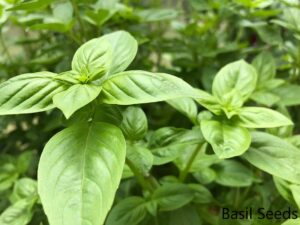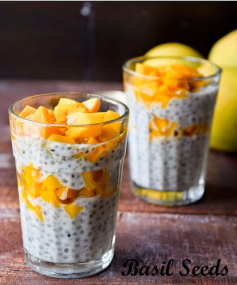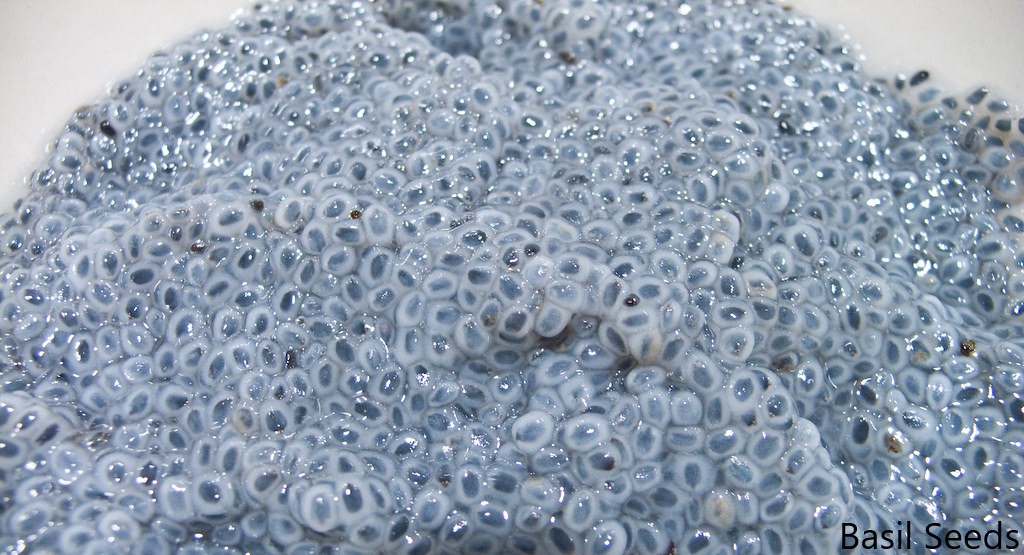If you make a purchase after clicking on one of our links, we may get a small commission.
Basil seeds, also known as tukmaria or sabja seeds, are small black seeds from the sweet basil plant (Ocimum basilicum). While commonly used in certain traditional cuisines, basil seeds are now recognized globally for their various health benefits. Though they may resemble chia seeds, these seeds are unique in their properties and benefits. So, what makes these little seeds so special? Let’s dive in.
| The Origins of Basil Seeds |
| Basil seeds have been used for centuries, especially in Ayurvedic and traditional Chinese medicine. Native to the tropical regions of Asia and Africa, they’ve been a hidden gem for those who value natural remedies. In countries like India, these seeds are commonly used to cool the body during hot summers, as they have a natural cooling effect. While their popularity has grown in the West only recently, these seeds have been celebrated in Eastern cultures for generations. |
| Nutritional Profile of Basil Seeds |
| Don’t let their tiny size fool you. These seeds pack a nutritional punch. From protein to fiber, antioxidants to omega-3 fatty acids, these seeds are a powerhouse of nutrients. Here is a breakdown of their key parts: |

| Basil seeds are a good plant-based source of protein. For vegans and vegetarians looking for alternative protein sources, these seeds offer an easy way to boost daily intake. This protein aids in muscle repair, immune function, and overall bodily health. |
| One of the standout features of these seeds is their high fiber content. Fiber is essential for digestive health and helps regulate bowel movements. A diet rich in fiber can also help prevent heart disease and lower cholesterol levels. Plus, it keeps you feeling full for longer, making it easier to manage weight. |
| Antioxidants are crucial for fighting free radicals in the body, which can lead to premature aging and chronic diseases. These seeds are loaded with antioxidants, especially flavonoids, which can help protect your cells from damage and reduce inflammation. |
| Health Benefits of Basil Seeds |
| Thanks to their impressive nutrient profile, these seeds offer a wide array of health benefits. Let’s explore some of the most compelling reasons to incorporate them into your diet: |
| Supports Digestive Health |
| These seeds are an excellent source of soluble fiber, which helps promote healthy digestion. When mixed with water, these seeds form a gel-like substance that soothes the stomach and relieves constipation. It’s a characteristic method for keeping your stomach related framework moving along as expected. |
| If you’re on a weight loss journey, these seeds can be your best friend. Their high fiber content causes you to feel full and fulfilled, diminishing the probability of gorging. They also help in curbing hunger pangs, especially when consumed before meals. Basil seeds may not be a miracle weight loss solution, but they’re definitely a valuable addition to a balanced diet. |
| Manages Blood Sugar Levels |
| Managing blood sugar levels is critical, especially for those with diabetes. These seeds have been shown to slow down the metabolism of carbohydrates, helping to stabilize blood sugar levels. This makes them a helpful dietary addition for people looking to maintain healthy blood sugar levels naturally. |
| Anti-Inflammatory Properties |
| Chronic inflammation is linked to many health conditions, from heart disease to arthritis. These seeds contain anti-inflammatory properties that help reduce inflammation in the body. This makes them not only a great food for your gut but also for your overall well-being. |
| Believe it or not, these seeds can also benefit your skin. Their antioxidant properties help fight free radicals, which can cause skin damage and aging. Regular consumption of these seeds may promote clearer, healthier skin by improving collagen production and reducing oxidative stress. |
| How to Consume Basil Seeds |
| You might be wondering, “How exactly do I eat basil seeds?” Fortunately, they’re inconceivably adaptable and simple to get ready. This is the way to take advantage of them: |
| Preparing Basil Seeds for Consumption |
These seeds must be soaked in water before eating. When soaked, they absorb water and swell up, forming a gel-like coating around the seed. To prepare them, simply soak a tablespoon of seeds in water for 15 to 30 minutes. Once they’re fully hydrated, they’re ready to be added to various dishes.
| Adding Basil Seeds to Recipes |
The neutral taste of basil seeds makes them easy to incorporate into a variety of recipes. From beverages to desserts, here are a few delicious ways to use them.

One of the most popular ways to consume basil seeds is in drinks. They add a fun, chewy texture to smoothies, lemonades, and even iced teas. Try mixing them into your favorite beverage for a nutrient boost.

| Healthy Snacks and Desserts |
These seeds can be used in yogurt, puddings, and other desserts to create healthy snacks. They blend well with fruits, honey, and other natural sweeteners. Want to make a guilt-free chia pudding alternative? Basil seeds can give you that same texture and nutritional benefit.
| Potential Side Effects of Basil Seeds |
While these seeds are generally safe for most people, there are a few potential side effects to keep in mind. For instance, eating too many basil seeds can cause digestive issues, like bloating or gas, especially if you’re not used to a high-fiber diet. It’s also worth noting that some people may have allergic reactions to basil seeds, so it’s best to start with a small amount.
With the rising popularity of basil seeds, they are now available in many grocery stores, health food stores, and online marketplaces. You can usually find them in the health or organic section of the store, often next to chia or flax seeds. When shopping, look for high-quality, organic seeds to ensure you’re getting the best product.
Conclusion
Basil seeds may be small, but they’re packed with nutrients and health benefits. Whether you’re looking to improve digestion, stabilize blood sugar levels, or just add some extra nutrition to your meals, these seeds are an excellent choice. They’re versatile, easy to prepare, and incredibly beneficial for your overall well-being. So why not give them a try? Start adding these seeds to your diet today and enjoy the natural health boost they offer.
FAQs
| Are basil seeds the same as chia seeds? |
While these seeds and chia seeds look similar, they come from different plants and have slightly different nutritional profiles. Both are nutritious, but these seeds are higher in fiber. |
| How long should I soak basil seeds before eating? |
These seeds should be soaked for at least 15 to 30 minutes until they develop a gel-like consistency. |
| Can basil seeds help with weight loss? |
Yes, due to their high fiber content, basil seeds can help you feel full longer, making it easier to manage your appetite and weight. |
| Are basil seeds safe for everyone? |
Generally, yes. However, some people may experience digestive discomfort if they consume too many. It’s ideal to begin with a limited quantity and steadily increment. |
| Where can I buy basil seeds? |
You can find these seeds in health food stores, organic sections of grocery stores, and online marketplaces. Always opt for high-quality, organic seeds if possible. |




